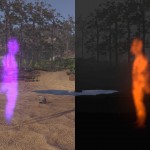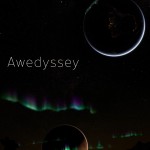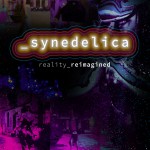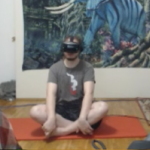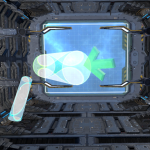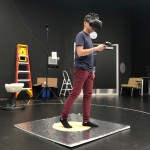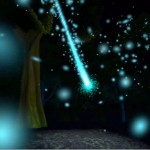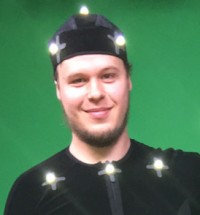
Biography
Noah joined the iSpace team in Fall 2018 as a PhD student. He has a Bachelor and Master’s in Computer Science from the University of Minnesota Duluth. In his Master’s, he researched the difference between interface affordances of real-world and virtual objects in virtual reality. During this time, he also worked in the interdisciplinary MMAD Lab as a motion capture technician and research assistant where he worked with Biomechanics, Engineers, Dancers, Artists, and Mathematicians. His research focuses on interdisciplinary approaches to using virtual reality for self transformative experiences aimed at mental health issues, reducing postoperative pain with VR, self-transcendence, and locomotion in VR. His other interests include philosophy, game design, and HCI.
Projects
Echoes of Me
Echoes of Me is an experience that invites participants into an intimate dialogue with themselves through an immersive XR journey inspired by research on self-compassion and perspective-taking in VR. The experience is designed to evoke conceptual change and feelings of self-compassion through virtual embodiment and embodied interaction. Echoes of Me is a guided encounter, not about becoming someon...
Compassionate Connection Oasis VR Toolkit (ccOasisVR)
Empowering Emerging Adults through Compassion and Enhanced Social Connection: Co-creating a Compassionate Connection Oasis VR Toolkit (ccOasisVR) Emerging adulthood (18-25) is a critical developmental phase, a tumultuous transition marked by heightened distress, and, unfortunately, a decreased likelihood that Emerging Adults (EAs) will seek support. The COVID-19 pandemic further exposed the urge...
Pathways to flourishing
Leveraging Virtual Reality for cultivating compassion, resilience, social connectedness, and healthy habits in emerging adults facing chronic health challenges About half of youths with chronic physical conditions develop anxiety and/or depression, causing significant distress and disruption within their lives over many years. This underscores their need for well-being tools- particularly ones t...
Awedyssey: VR for promoting and enhancing well-being
We are investigating and creating a new virtual reality (VR) experience, 'Awedyssey', for the promotion and enhancement of well-being. Today, digital technology pervasively intersects with our daily lives, and VR stands out as a digital tool capable of fostering positive emotion like awe, self-transcendence, and authentic social connection. Connecting with nature is very important for our mental...
Synedelica
Reality - Reimagined Synedelica reimagines what is possible with immersive technology, providing a new perspective on reality. In this synesthetic mixed reality experience, visuals of the real world are modulated by sound, attuning immersants to the beauty hidden in the seemingly mundane. Synedelica shows the world in a new light, rekindling childlike wonder and encouraging exploration. ...
Autoethnographic Close Reading of Self-transcendent VR Experiences
Sipping the Virtual Elixir: An autoethnographic close reading of Ayahuasca Kosmik Journey a self-transcendent virtual experience. Recently self-transcendent experiences are gaining interest in the research community because of their ability to support wellbeing. Experiences of self-transcendence can be transformative, leading to a diminishment of self/ego and the feeling of unity with n...
SIRIUS - Virtual Earthgazing to mitigate effects of sensory isolation
SIRIUS (Scientific International Research in Unique Terrestrial Station) is a series of on-land isolation experiments modelling long-term spaceflight in order to assess the psychophysiological effects of isolation on a crew and prepare for long-duration spaceflights, such as a trip to Mars. An 8-month-long isolation study commenced in Moscow on Nov 4th, 2021, where a crew of 6 people (from Roscosm...
Embodied & Intuitive Flying for VR, Gaming, and TeleOperation
Flying has been a dream for mankind for millenia - but flying interfaces for VR, gaming, and teleoperation (e.g., drones) typically rely on cumbersome double-joystick/gamepads and do not allow for intuitive and embodied flying experiences. Here, we develop low-cost embodied flying interfaces that adapt leaning-based motion cueing paradigms thus freeing up hands for additional tasks beyond just na...
NaviBoard: Efficiently Navigating Virtual Environments
Here we propose a novel and cost-effective setup of a leaning-based interface ("NaviBoard") that allows people to efficiently navigate virtual environments - with performance levels matching the gold standard of free-space walking, without any increase in motion sickness Abstract Walking has always been the most common locomotion mode for humans in the real world. As a result, it has also been co...
Connected through "AWE": creating immersive experiences for social connection
Do you get enough “awe” in your life? In our busy day-to-day lives, we often take our experiences for granted. While we have the technology to connect with one another, like smart phones, we don’t necessarily get outside with nature, or stargaze. Such activities may consist of common awe-inspiring moments, and we now understand that feeling awe is associated with all sorts of social and well...
Gamified Research
Gamifying Research - Researchifying Games While traditional experimental paradigms offer tight stimulus control and repeatability, then tend to be a bit boring and removed from many real-world situations, which can limit real-world transferability of results. How can we bring together the methodological strenghs of research with the intrinsic motivation of playfulness and gaming? The ...
